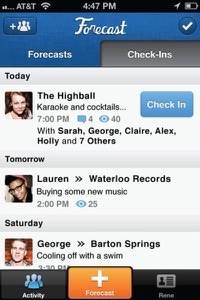Forecast, an app that aimed to make it easier for people to use Facebook and Foursquare to connect in the real world, told users in an email late Monday night that it is shutting down. The sudden end comes after rave reviews in tech circles and in mainstream publications (the app boasts a blurb on its website from The New York Times, as well as an endorsement from App Advice calling Forecast a “game-changer in the world of social networking”). Ultimately, however, Forecast offers a case study in how even good apps sometimes fail.

“The time has come for Forecast to shut its doors. Starting on July 1, our mobile apps and website will not work,” founder René Pinnell wrote. “Although we’re passionate about building great products that help people connect in the real world, we have run out of resources to keep the Forecast project afloat.”
We’ve asked Forecast for comment and to elaborate on the email it sent to users. We’ll update as soon as we hear back from them.
In the meantine, users will have to adjust. “I’m sad,” said James Gifford, who used the app in large part because of its hip factor. “I wasn’t the most avid user, but it was a useful service.”
What Went Wrong?
Developed by Hurricane Inc., which also makes Hurricane Party, an app that helps people use their mobile devices to throw “spontaneous parties,” the idea behind Forecast was to go one step beyond a Facebook or Foursquare check-in, which lets people know where you are now, and instead enable you to tell them where you plan to be.
The iOS version of the app got mostly positive reviews on Apple’s App Store, but the Android version seemed to be plagued by crashes. Other users complained that it wouldn’t let them forecast events more than two weeks in advance. That, the company said in its FAQ, was to keep Forecast spontaneous, and because “we’ve discovered that when you limit people to the near future they become much more reliable.”
The app itself was relatively basic, but several users commented that it “has loads of pontential” and that they were “hoping for more improvements and development.” The simple design and intutive nature was most likely to help people understand the key difference between a Forecast and a Facebook status update or FourSquare check-in.
The name also may not have helped; when you search “Forecast social app” in both the Apple and Android App Stores, you have to scroll through dozens of weather-related apps. And despite the strong reviews, not a lot of people seemed to be using the app. It’s a classic social startup problem in that if you build it, it only offers value to users if they can find their friends on it.
“It integrates with Foursquare and Facebook, which is – was – useful,” Gifford said. “To some extent, it brought the simple idea of FourSquare to planning your day. ‘Where am I going to be, and what am I doing there?’”

















